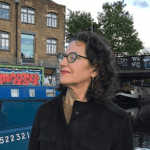 Karen Bassi, Institute Co-Director
Karen Bassi, Institute Co-Director
Karen Bassi, Professor of Classics and Literature at UC Santa Cruz, will co-direct the project. Her most recent book, Traces of the Past: Classics between History and Archaeology (University of Michigan Press 2016), explores the ways in which material phenomena structure time in ancient Greek literature and is framed by theoretical debates in contemporary museum studies. Her recent awards include the T.B.L. Webster Fellowship at the Institute for Classical Studies at the University of London (spring 2017), and an NEH Research Fellowship in the Humanities (2017-18). At UCSC, she has served as Chair of the Literature Department and Director of the Classics Program. She has proven experience in fostering collaborative and interdisciplinary research projects across cultures and periods, including as Director of a successful NEH Institute in Athens in Summer 2014 (“Mortality: Facing Death in Ancient Greece”) and as Principal Investigator for a related Humanities Research Residency for faculty and graduate students at the University of California at Irvine in Fall 2015.
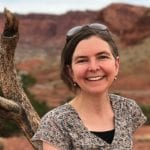 Gretchen Henderson, Institute Co-Director
Gretchen Henderson, Institute Co-Director
Gretchen Henderson works to bridge disciplines through the arts and public humanities. She is the Annie Clark Tanner Fellow in Environmental Humanities at the University of Utah, Lecturer in English at Georgetown University, Affiliated Scholar in Art History at Kenyon College, and Research Associate at UCSC. Some of her recent commendations include the Hodson Trust-JCB Fellow in Creative Arts at Brown University, Distinguished Speaker in Art History at Rutgers University, Visiting Artist in Music at MIT, with additional support from the Mellon Foundation and NEH. Gretchen is a frequent public speaker with radio interviews on NPR, BBC, and other international radio programs. Her fourth and latest book, Ugliness: A Cultural History (Reaktion Books of London/University of Chicago Press, translated in 2018 for Turkish, Korean, Chinese, and Spanish editions), untangles the relationship between aesthetics and cultural representations from antiquity to the present. Much of Gretchen’s work grows out of museums, and her museum-based courses at MIT and Georgetown were a catalyst for this NEH Institute.
Visiting Faculty:
 Amanda Cobb-Greetham serves as Professor and Chair of the Department of Native American Studies at the University of Oklahoma. Her scholarship has been recognized with the American Book Award for Listening to Our Grandmothers’ Stories: The Bloomfield Academy for Chickasaw Females. She was co-editor of The National Museum of the American Indian: Critical Conversations with Amy Lonetree and also served as editor of American Indian Quarterly for nine years. From 2007 to 2012, she oversaw the Chickasaw Nation’s Division of History and Culture and directed the curation and launch of the state-of-the-art Chickasaw Cultural Center in Sulphur, Oklahoma. She serves on the Board of Trustees of the Smithsonian National Museum of the American Indian. In 2018, she received the Chickasaw Nation’s Dynamic Woman of the Year Award.
Amanda Cobb-Greetham serves as Professor and Chair of the Department of Native American Studies at the University of Oklahoma. Her scholarship has been recognized with the American Book Award for Listening to Our Grandmothers’ Stories: The Bloomfield Academy for Chickasaw Females. She was co-editor of The National Museum of the American Indian: Critical Conversations with Amy Lonetree and also served as editor of American Indian Quarterly for nine years. From 2007 to 2012, she oversaw the Chickasaw Nation’s Division of History and Culture and directed the curation and launch of the state-of-the-art Chickasaw Cultural Center in Sulphur, Oklahoma. She serves on the Board of Trustees of the Smithsonian National Museum of the American Indian. In 2018, she received the Chickasaw Nation’s Dynamic Woman of the Year Award.
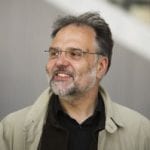 Kurt Fendt is Senior Lecturer at the Massachusetts Institute of Technology in Comparative Media Studies/Writing and Global Studies and Languages, and also Director of the Active Archives initiative. He has collaborated with museums in the US and abroad on new formats for visitor engagement enabled by digital technologies. In close collaboration with Boston-area museums, his students regularly develop innovative approaches to enhancing the museum experience. Formerly the Executive Director of MIT’s HyperStudio for Digital Humanities, Fendt is co-Principal Investigator of the NEH-funded “Annotation Studio: Multimedia Annotation for Students.” He has held visiting professorships at the University of Cologne, the Technical University of Aachen, the University of Klagenfurt, Austria, and the Fraunhofer Institute in Sankt Augustin, Germany.
Kurt Fendt is Senior Lecturer at the Massachusetts Institute of Technology in Comparative Media Studies/Writing and Global Studies and Languages, and also Director of the Active Archives initiative. He has collaborated with museums in the US and abroad on new formats for visitor engagement enabled by digital technologies. In close collaboration with Boston-area museums, his students regularly develop innovative approaches to enhancing the museum experience. Formerly the Executive Director of MIT’s HyperStudio for Digital Humanities, Fendt is co-Principal Investigator of the NEH-funded “Annotation Studio: Multimedia Annotation for Students.” He has held visiting professorships at the University of Cologne, the Technical University of Aachen, the University of Klagenfurt, Austria, and the Fraunhofer Institute in Sankt Augustin, Germany.
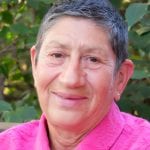 Elaine Heumann Gurian is former Deputy Director to major institutions including the United States Holocaust Memorial Museum and The National Museum of the American Indian, and was the Deputy Assistant Secretary for Museums, Smithsonian Institution from 1987-1990. Her many books and publications include Civilizing the Museum: The Collected Writings of Elaine Heumann Gurian (Routledge 2006). Gurian was named as one of the 100 Centennial Honor Roll members by the American Alliance of Museums which also awarded her its highest honor, the Distinguished Service to Museums Award in 2004.
Elaine Heumann Gurian is former Deputy Director to major institutions including the United States Holocaust Memorial Museum and The National Museum of the American Indian, and was the Deputy Assistant Secretary for Museums, Smithsonian Institution from 1987-1990. Her many books and publications include Civilizing the Museum: The Collected Writings of Elaine Heumann Gurian (Routledge 2006). Gurian was named as one of the 100 Centennial Honor Roll members by the American Alliance of Museums which also awarded her its highest honor, the Distinguished Service to Museums Award in 2004.
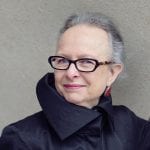 Barbara Kirshenblatt-Gimblett is University Professor Emerita and Professor Emerita of Performance Studies at New York University. She is chief Curator of the Core Exhibition at the POLIN Museum of the History of Polish Jews. Her many books include Destination Culture: Tourism, Museums, and Heritage (University of California Press 1998). She is the recipient of a lifetime achievement award from the Foundation for Jewish Culture, an honorary doctorate from the Jewish Theological Seminary in New York, and the Order of Merit of the Republic of Poland from the President of Poland. She serves on several Advisory Boards including the Council of American Jewish Museums, the Berlin Jewish Museum, and the Jewish Museum and Tolerance Center in Moscow.
Barbara Kirshenblatt-Gimblett is University Professor Emerita and Professor Emerita of Performance Studies at New York University. She is chief Curator of the Core Exhibition at the POLIN Museum of the History of Polish Jews. Her many books include Destination Culture: Tourism, Museums, and Heritage (University of California Press 1998). She is the recipient of a lifetime achievement award from the Foundation for Jewish Culture, an honorary doctorate from the Jewish Theological Seminary in New York, and the Order of Merit of the Republic of Poland from the President of Poland. She serves on several Advisory Boards including the Council of American Jewish Museums, the Berlin Jewish Museum, and the Jewish Museum and Tolerance Center in Moscow.
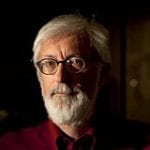 Steven Lubar is a Professor of American Studies, History, and History of Art and Architecture at Brown University. At Brown, he has been Director of the John Nicholas Brown Center for Public Humanities and Cultural Heritage, and Director of the Haffenreffer Museum of Anthropology. For twenty years he was a curator at the National Museum of American History, responsible for collections and exhibitions in the history of technology and American social and cultural history. His publications include books and articles on collecting, exhibitions, and museum history. He received a Guggenheim fellowship (2015) for his latest book titled Inside the Lost Museum (Harvard University Press 2017).
Steven Lubar is a Professor of American Studies, History, and History of Art and Architecture at Brown University. At Brown, he has been Director of the John Nicholas Brown Center for Public Humanities and Cultural Heritage, and Director of the Haffenreffer Museum of Anthropology. For twenty years he was a curator at the National Museum of American History, responsible for collections and exhibitions in the history of technology and American social and cultural history. His publications include books and articles on collecting, exhibitions, and museum history. He received a Guggenheim fellowship (2015) for his latest book titled Inside the Lost Museum (Harvard University Press 2017).
 Amelia Wong is the web content strategist at The J. Paul Getty Trust, an independent scholar, and a museum consultant. Previously she was an assistant professor at The George Washington University, where she designed the Museum Studies Program’s curriculum for digital media and developed social media outreach and web content for the United States Holocaust Memorial Museum. Her work concentrates on issues of engagement and communication within museums, including social media and storytelling. In 2010 she received a Diversity Fellowship from the American Association of Museums.
Amelia Wong is the web content strategist at The J. Paul Getty Trust, an independent scholar, and a museum consultant. Previously she was an assistant professor at The George Washington University, where she designed the Museum Studies Program’s curriculum for digital media and developed social media outreach and web content for the United States Holocaust Memorial Museum. Her work concentrates on issues of engagement and communication within museums, including social media and storytelling. In 2010 she received a Diversity Fellowship from the American Association of Museums.
Visiting Artist:
 Darren Waterston has been exhibiting his installations, paintings, and works on paper in the U.S. and abroad since the early 1990s. His installation Filthy Lucre (2015-17) at The Smithsonian Institution’s Freer|Sackler Galleries began as part of the exhibition Uncertain Beauty at MASS MoCA in North Adams, MA, and illuminates parallels between the excesses and inequities of the Gilded Age and the social and economic disparities of our own time. Waterston’s paintings are included in numerous permanent collections, including the Los Angeles County Museum of Art, the Fine Arts Museums of San Francisco, the New York Public Library, the Portland (Oregon) Art Museum, the Seattle Art Museum, and the Museum of Fine Arts in Houston.
Darren Waterston has been exhibiting his installations, paintings, and works on paper in the U.S. and abroad since the early 1990s. His installation Filthy Lucre (2015-17) at The Smithsonian Institution’s Freer|Sackler Galleries began as part of the exhibition Uncertain Beauty at MASS MoCA in North Adams, MA, and illuminates parallels between the excesses and inequities of the Gilded Age and the social and economic disparities of our own time. Waterston’s paintings are included in numerous permanent collections, including the Los Angeles County Museum of Art, the Fine Arts Museums of San Francisco, the New York Public Library, the Portland (Oregon) Art Museum, the Seattle Art Museum, and the Museum of Fine Arts in Houston.
Local Museum Specialists:
 Freddie J. Bitsoie (Diné) is the Executive Chef at National Museum of the American Indian. He has been cooking professionally for over 10 years and has been working with Native Foodways for most of that time. He is one of a few Native American Chefs at the forefront of preparing, presenting, and educating foods indigenous to the Americas. He has been featured in America, The Cookbook, The New York Times, “Lidia Celebrates America” with Lidia Bastianich, and NPR. Chef Freddie was born in Monticello, UT, raised in Arizona, and lived in New Mexico. He attended the University of New Mexico studying Anthropology and Art History and also studied Culinary Arts in Scottsdale, AZ. He currently resides in Washington, DC, where he shares his motto, “There’s no shame in eating.”
Freddie J. Bitsoie (Diné) is the Executive Chef at National Museum of the American Indian. He has been cooking professionally for over 10 years and has been working with Native Foodways for most of that time. He is one of a few Native American Chefs at the forefront of preparing, presenting, and educating foods indigenous to the Americas. He has been featured in America, The Cookbook, The New York Times, “Lidia Celebrates America” with Lidia Bastianich, and NPR. Chef Freddie was born in Monticello, UT, raised in Arizona, and lived in New Mexico. He attended the University of New Mexico studying Anthropology and Art History and also studied Culinary Arts in Scottsdale, AZ. He currently resides in Washington, DC, where he shares his motto, “There’s no shame in eating.”
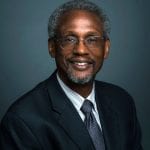 Spencer Crew is the interim Director of the National Museum of African American History and Culture (NMAAHC) and Robinson Professor of U.S. History at George Mason University. He has served as president of the National Underground Railroad Freedom Center and was director of the Smithsonian National Museum of American History. His earlier exhibitions include the groundbreaking “Field to Factory: Afro-American Migration 1915-1940,” and his books include Field to Factory: Afro-American Migration 1915 – 1940 (1987). Spencer is the Past Chair of the National Council for History Education, serves on the Board of the National Trust for Historic Preservation, and was selected to The Organization of American Historians’ Distinguished Lectureship Program.
Spencer Crew is the interim Director of the National Museum of African American History and Culture (NMAAHC) and Robinson Professor of U.S. History at George Mason University. He has served as president of the National Underground Railroad Freedom Center and was director of the Smithsonian National Museum of American History. His earlier exhibitions include the groundbreaking “Field to Factory: Afro-American Migration 1915-1940,” and his books include Field to Factory: Afro-American Migration 1915 – 1940 (1987). Spencer is the Past Chair of the National Council for History Education, serves on the Board of the National Trust for Historic Preservation, and was selected to The Organization of American Historians’ Distinguished Lectureship Program.
 Cécile R. Ganteaume is an associate curator at the Smithsonian’s National Museum of the American Indian in Washington, D.C., and formerly at the Museum of the American Indian, Heye Foundation, in New York. A recipient of the Secretary of the Smithsonian’s Excellence in Research Award, Ganteaume writes on American Indian art, culture, and history. She is co-curator of the exhibition Americans. Her most recent book, Officially Indian: Symbols That Define the United States, published in fall 2017, is the companion book to Americans. She is also a team recipient of the 2018 Smithsonian Excellence in Exhibitions Award, as well as 2018 American Alliance of Museums Excellence in Exhibitions Award.
Cécile R. Ganteaume is an associate curator at the Smithsonian’s National Museum of the American Indian in Washington, D.C., and formerly at the Museum of the American Indian, Heye Foundation, in New York. A recipient of the Secretary of the Smithsonian’s Excellence in Research Award, Ganteaume writes on American Indian art, culture, and history. She is co-curator of the exhibition Americans. Her most recent book, Officially Indian: Symbols That Define the United States, published in fall 2017, is the companion book to Americans. She is also a team recipient of the 2018 Smithsonian Excellence in Exhibitions Award, as well as 2018 American Alliance of Museums Excellence in Exhibitions Award.
 Lee Glazer is the founding director of the Lunder Institute for American Art at Colby College. Before her arrival in Maine, she served as Associate Curator of American Art at the Smithsonian’s Freer Gallery of Art and Arthur M. Sackler Gallery. She has published extensively on American Art of the Gilded Age and more specifically on James McNeil Whistler. Lee has organized over twenty exhibitions including Peacock Room REMIX: Darren Waterston’s Filthy Lucre; Winslow Homer: Four Views of Nature; Seascapes: Tryon and Sugimoto; and An American in London: Whistler and the Thames.
Lee Glazer is the founding director of the Lunder Institute for American Art at Colby College. Before her arrival in Maine, she served as Associate Curator of American Art at the Smithsonian’s Freer Gallery of Art and Arthur M. Sackler Gallery. She has published extensively on American Art of the Gilded Age and more specifically on James McNeil Whistler. Lee has organized over twenty exhibitions including Peacock Room REMIX: Darren Waterston’s Filthy Lucre; Winslow Homer: Four Views of Nature; Seascapes: Tryon and Sugimoto; and An American in London: Whistler and the Thames.
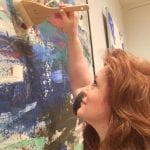 Amber Kerr is Chief of Conservation at the Lunder Conservation Center at the Smithsonian American Art Museum. She specializes in paintings conservation and the care of the collections, while facilitating conservation training and public outreach through the visible labs of the LCC. Her training in paintings conservation has included a number of museums in the United States and France. Amber was a Samuel H. Kress Foundation Fellow and received her M.S. from Winterthur/University of Delaware Program in Art Conservation. She has served on the boards of the Washington Conservation Guild, Virginia Conservation Association, and the International Institute for Conservation where she is currently a Vice President.
Amber Kerr is Chief of Conservation at the Lunder Conservation Center at the Smithsonian American Art Museum. She specializes in paintings conservation and the care of the collections, while facilitating conservation training and public outreach through the visible labs of the LCC. Her training in paintings conservation has included a number of museums in the United States and France. Amber was a Samuel H. Kress Foundation Fellow and received her M.S. from Winterthur/University of Delaware Program in Art Conservation. She has served on the boards of the Washington Conservation Guild, Virginia Conservation Association, and the International Institute for Conservation where she is currently a Vice President.
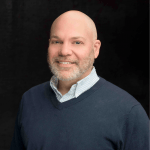 Jeffrey Parker works at the United States Holocaust Memorial Museum as Program Coordinator of Education Initiatives in the Levine Institute for Holocaust Education and leads the Holocaust Institute for Teacher Educators (HITE). The HITE program works with methodology professors and examines best practices in preparing teacher candidates to address the Holocaust in their future classrooms. Before joining the Museum, Jeff taught high school English in the Finger Lakes region of New York State for 23 years. He is completing work on a Ph.D. in Teaching and Curriculum at the University of Rochester, focusing on the area of Holocaust Education.
Jeffrey Parker works at the United States Holocaust Memorial Museum as Program Coordinator of Education Initiatives in the Levine Institute for Holocaust Education and leads the Holocaust Institute for Teacher Educators (HITE). The HITE program works with methodology professors and examines best practices in preparing teacher candidates to address the Holocaust in their future classrooms. Before joining the Museum, Jeff taught high school English in the Finger Lakes region of New York State for 23 years. He is completing work on a Ph.D. in Teaching and Curriculum at the University of Rochester, focusing on the area of Holocaust Education.
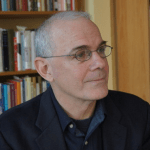 David W. Penney is the Associate Director of the National Museum of the American Indian’s Scholarship Department, where he manages the offices of history and culture, Latin America, collections research and documentation, contemporary art, and repatriation. David spent 30 years at the Detroit Institute of Arts, including as Vice President of Exhibitions and Collections Strategies and as Chief Curator, where he directed the creation of one of the finest Native American collections in the country. He is an internationally recognized scholar, curator, and museum professional in the field of Native American art and culture.
David W. Penney is the Associate Director of the National Museum of the American Indian’s Scholarship Department, where he manages the offices of history and culture, Latin America, collections research and documentation, contemporary art, and repatriation. David spent 30 years at the Detroit Institute of Arts, including as Vice President of Exhibitions and Collections Strategies and as Chief Curator, where he directed the creation of one of the finest Native American collections in the country. He is an internationally recognized scholar, curator, and museum professional in the field of Native American art and culture.
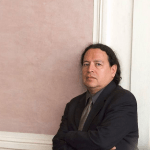 Paul Chaat Smith (Comanche) is the co-curator of the exhibition Americans, on view at the National Museum of the American Indian, where he is Associate Curator. His books and exhibitions focus on the contemporary landscape of American Indian politics and culture. He is the author of Everything You Know about Indians Is Wrong (University of Minnesota Press 2009) and, with Robert Warrior, Like a Hurricane: the Indian Movement from Alcatraz to Wounded Knee (New Press 1996). In 2017, he was selected to deliver the Eleventh Distinguished Critic Lecture by the Association of International Art Critics–USA.
Paul Chaat Smith (Comanche) is the co-curator of the exhibition Americans, on view at the National Museum of the American Indian, where he is Associate Curator. His books and exhibitions focus on the contemporary landscape of American Indian politics and culture. He is the author of Everything You Know about Indians Is Wrong (University of Minnesota Press 2009) and, with Robert Warrior, Like a Hurricane: the Indian Movement from Alcatraz to Wounded Knee (New Press 1996). In 2017, he was selected to deliver the Eleventh Distinguished Critic Lecture by the Association of International Art Critics–USA.
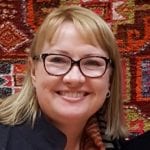 Corine Wegener is director of the Smithsonian Cultural Rescue Initiative, an outreach program aiming to preserve cultural heritage in crisis situations in the U.S. and abroad, including projects in Syria, Iraq, Haiti, and Nepal. She specializes in cultural property protection during natural disasters, recovery of arts and artifacts, and armed conflict mitigation. Before joining the Smithsonian’s Haiti Cultural Recovery Project, she was associate curator of Decorative Arts, Textiles, and Sculpture at Minneapolis Institute of Arts. As a member of U.S. Army Reserve, she also served on several military deployments, including as an Arts, Monuments, and Archives Officer after the 2003 looting of the Iraq National Museum. Cori is president and founder of the U.S. Committee of the Blue Shield, which supports The Hague Convention for Protection of Cultural Property in the Event of Armed Conflict (1954).
Corine Wegener is director of the Smithsonian Cultural Rescue Initiative, an outreach program aiming to preserve cultural heritage in crisis situations in the U.S. and abroad, including projects in Syria, Iraq, Haiti, and Nepal. She specializes in cultural property protection during natural disasters, recovery of arts and artifacts, and armed conflict mitigation. Before joining the Smithsonian’s Haiti Cultural Recovery Project, she was associate curator of Decorative Arts, Textiles, and Sculpture at Minneapolis Institute of Arts. As a member of U.S. Army Reserve, she also served on several military deployments, including as an Arts, Monuments, and Archives Officer after the 2003 looting of the Iraq National Museum. Cori is president and founder of the U.S. Committee of the Blue Shield, which supports The Hague Convention for Protection of Cultural Property in the Event of Armed Conflict (1954).
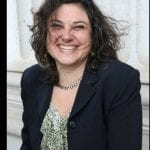 Shari Rosenstein Werb is the new Director of the Center for Learning, Literacy and Engagement at the Library of Congress. She is leading an initiative to increase public engagement with the Library’s unique collections, experts, and services through educational and cultural programming, visitor engagement offerings, and outreach initiatives. Previously at the Smithsonian Institution for a decade, she directed education, outreach, and visitor experience at the National Museum of Natural History and led the transformation of public engagement, including the opening of Q?rius (pronounced “curious”), the Coralyn W. Whitney Science Education Center (2013), a nationally recognized model for promoting public learning about science and its relevance to our world. Before joining the Smithsonian, Shari spent over 17 years working at the U.S. Holocaust Memorial Museum.
Shari Rosenstein Werb is the new Director of the Center for Learning, Literacy and Engagement at the Library of Congress. She is leading an initiative to increase public engagement with the Library’s unique collections, experts, and services through educational and cultural programming, visitor engagement offerings, and outreach initiatives. Previously at the Smithsonian Institution for a decade, she directed education, outreach, and visitor experience at the National Museum of Natural History and led the transformation of public engagement, including the opening of Q?rius (pronounced “curious”), the Coralyn W. Whitney Science Education Center (2013), a nationally recognized model for promoting public learning about science and its relevance to our world. Before joining the Smithsonian, Shari spent over 17 years working at the U.S. Holocaust Memorial Museum.
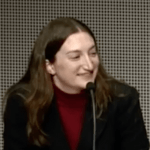 Leah Wolfson is the Senior Program Officer in the Mandel Center for Advanced Holocaust Studies at the United States Holocaust Memorial Museum. Dr. Wolfson is the author of the book, Jewish Responses to Persecution, 1933-1946 (Rowman and Littlefield 2015) and serves as one of two project leads for the Mandel Center’s first efforts in Digital Humanities. She received her Ph.D. in Comparative Literature with an emphasis in Jewish Studies from Emory University and has served as Visiting Assistant Professor in the Jewish Studies Program at the College of Charleston, SC, where she taught courses in Holocaust literature.
Leah Wolfson is the Senior Program Officer in the Mandel Center for Advanced Holocaust Studies at the United States Holocaust Memorial Museum. Dr. Wolfson is the author of the book, Jewish Responses to Persecution, 1933-1946 (Rowman and Littlefield 2015) and serves as one of two project leads for the Mandel Center’s first efforts in Digital Humanities. She received her Ph.D. in Comparative Literature with an emphasis in Jewish Studies from Emory University and has served as Visiting Assistant Professor in the Jewish Studies Program at the College of Charleston, SC, where she taught courses in Holocaust literature.
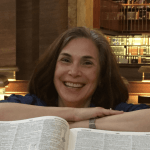 Abby Yochelson has worked for three decades at the Library of Congress as a reference librarian in the spectacular Main Reading Room, where she fields questions across the humanities and social sciences. As the English and American Literature specialist, she is dedicated to literacy and spreading the joy of reading and was honored as the 2015 Volunteer of the Year for the Everybody Wins DC Reading Program. Librarianship was a late vocation with her first love being museums. She was fortunate to land her first job out of college at the Smithsonian after growing up in her paleontologist father’s office at the National Museum of Natural History.
Abby Yochelson has worked for three decades at the Library of Congress as a reference librarian in the spectacular Main Reading Room, where she fields questions across the humanities and social sciences. As the English and American Literature specialist, she is dedicated to literacy and spreading the joy of reading and was honored as the 2015 Volunteer of the Year for the Everybody Wins DC Reading Program. Librarianship was a late vocation with her first love being museums. She was fortunate to land her first job out of college at the Smithsonian after growing up in her paleontologist father’s office at the National Museum of Natural History.
